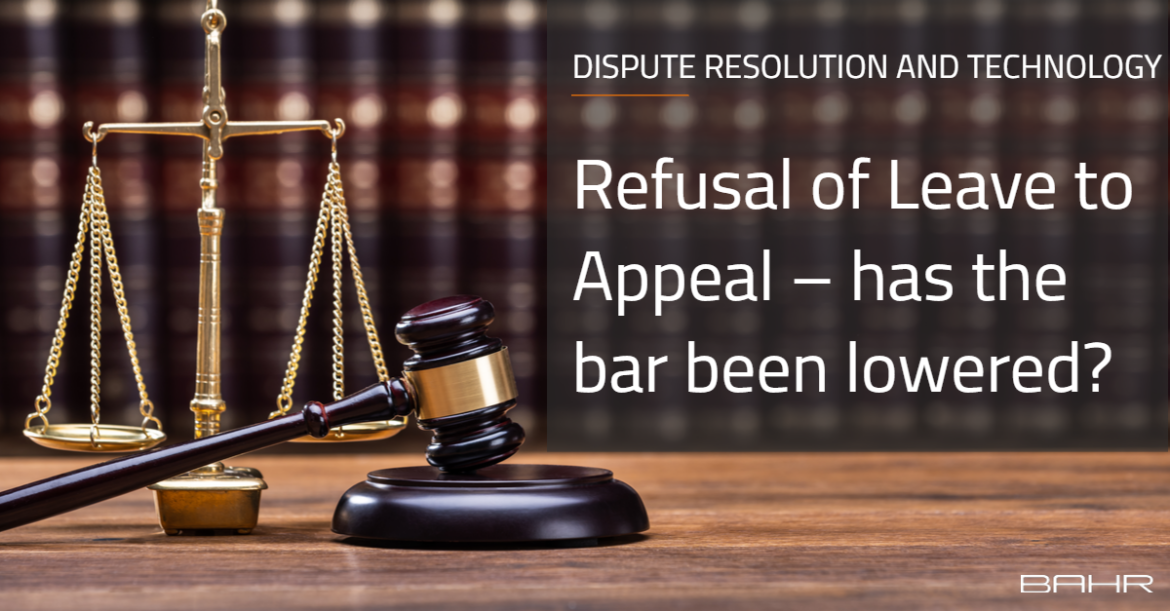Refusal of Leave to Appeal – has the bar been lowered?

Pursuant to Norwegian law, the general point of departure is that all judgements, verdicts, and decisions by the District Courts may be appealed to the Courts of Appeal, cf. section 29-2, cf. section 29-1, of the Dispute Act. However, the Courts of Appeal “may refuse leave to appeal against a judgment if it finds it clear that the appeal will not succeed”, cf. section 29-13, subsection 2, of the Dispute Act.[2] According to the preparatory works, “clear” shall be subject to a strict interpretation, requiring a “high degree of certainty that the result would remain the same after full appeal proceedings”.[3]
The Courts of Appeal’s power to refuse leaving appeal against a judgment is an important tool for stopping so-called ‘hopeless appeals’ before further costs accrue.[4] However, since a decision on refusal is based on simplified, written proceedings, it effectively deprives the appellant its right to oral appeal proceedings. This may be problematic in certain types of cases, e.g., in very comprehensive cases or cases where the outcome is dependent on complicated technical assessments. Further, a decision on refusal of leave to appeal a judgement may only be appealed on the grounds of a procedural error, cf. section 29-13, subsection 5, of the Dispute Act. Such procedural error may be present if the court of appeal did not have a sound basis to conclude on the factual and legal questions of the case.[5]
In the Supreme Court’s appeals committee’s decision HR‑2022-634‑U, the Court of Appeal had reached its decision based on a written and simplified procedure pursuant to section 29-13, subsection 2, without use of expert lay judges or expert witness testimony. The appellant argued that the case was not suited for written and simplified procedures, as the outcome was dependent on input from experts. The need for expertise was further substantiated by the fact that the European Patent Office (EPO) had granted a European patent for the same invention and a corresponding patent was upheld after opposition by the High Court of Justice in England and Wales.
The majority of the Supreme Court’s appeals committee found that the Court of Appeal’s decision on refusal was made on a sound basis. The use of expert witnesses or judges had not been necessary for the assessment of the patent’s validity, as the Court of Appeal could rely on statements provided by expert witnesses during the proceedings in the District Court. On the decisions by the EPO and the Hight Court of Justice in England and Wales, the Supreme Court’s appeal committee noted that there is nothing extraordinary in the outcome of patent cases varying in different jurisdictions.
The minority (one dissenting judge) found that the lack of technical expertise during the written proceedings constituted a procedural error, as the assessment of the patent’s validity was a question on whether the invention was obvious to a person skilled in the art of medicine and/or pharmacy. Insight from such an expert was therefore required to provide a sound factual basis for the legal assessment. The dissenting judge further emphasized that the ‘Swingball Doctrine’,[6] which entails that the courts should exercise restraint in their re-examination of the patent authorities’ technical evaluations, means that a ‘particularly sound basis’ must be present for refusing leave to appeal a judgment where a patent is held invalid. Finally, the minority referred to the fact that the EPO had granted a patent based on the same invention, and that Norwegian patent law to a great extent is harmonized with European legislation.
In our opinion, the minority’s reasoning is suited to foster correct and secure decisions. There are good reasons for requiring a particularly sound basis when considering refusal of leave to appeal in complex technical cases, like the present. While refusing leave to appeal to some extent is a tool intended to keep the case backlog at manageable levels, it is important to keep in mind that the right to appeal is a cornerstone of the Norwegian legal system, and a refusal of leave to appeal will deprive the appellant of this fundamental right – especially since the access to appeal decisions on refusal is limited to grounds of procedural errors. With the majority’s decision in HR 2022-634-U, it appears, however, that the bar for refusal of leave to appeal has been lowered. It remains to see if this course will be governing for future appeal cases.
[1] Oslo District Court’s judgement 24 October 2018. The patent proprietor was represented by BAHR.
[2] Underlined here. Unofficial translation retrieved from https://lovdata.no/NLE/lov/2005-06-17-90/§29-13
[3] Ot.prp.nr.51 (2004-2005) page 476.
[4] Ot.prp.nr.51 (2004-2005) page 297.
[5] Cf. Rt-2015-506 para. 17.
[6] Established in the Supreme Court’s judgement Rt. 1975 p. 603.
